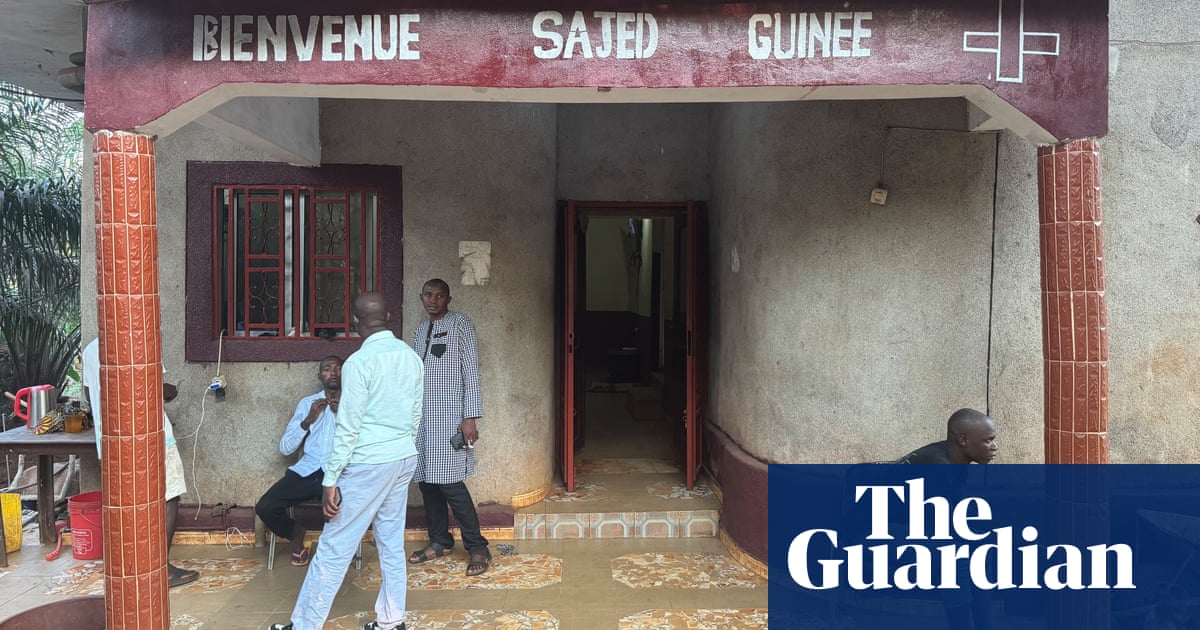At Guinea’s only private drug rehabilitation clinic, Dr Marie Koumbassa and her 15-person team are so convinced that drug use is a national emergency that they work for no pay.
Every week, SAJED-Guinée (Service for Helping Young People in Difficult Situations due to Drugs) receives dozens of distress calls from relatives of addicts who are then taken to the facility in the working-class Conakry neighbourhood of Dabompa.
In richer areas of the city, cocaine is the drug of choice. Elsewhere, the prevalent substances are tramadol, crack and – in a recent trend – kush,a deadly mixof cannabis, fentanyl, tramadol, formaldehyde andreportedly human bones. People who smoke it have been known to collapse, cause themselves bodily harm or even die.
“People come here from the madrasa [Islamic schools] and tell us that scholars told them: ‘Take this, you will read well and quickly learn’,” Koumbassa said, referring to kush. “It actually destroys them.”
The team first encountered kush in Conakry last March. Its use has now spread so much that patrons of nightclubs and lounges are known to be mixing it into shisha pots.
Unlike its neighbours Guinea Bissau – seen as a “narco-state” – and Sierra Leone, which is the regional hub for kush, drug abuse and trafficking are not readily associated with the more culturally conservative Guinea. But experts say a crisis is under way, fuelled by a growing market operated by cross-border trafficking syndicates.
“The gangs in Sierra Leone have always moved to Guinea [when necessary], said Kars de Bruijne, senior research fellow with Dutch thinktank Clingendael’s conflict research unit. “If a gang member committed a crime in Sierra Leone or was otherwise being looked for they would go to Guinea and hide out.
“Similarly, we are aware of boats that sometimes move materials including drugs from Guinea to Sierra Leone. There’s really a lively cross-border informal trade.”
Data about the drug abuse and trafficking situation is hard to come by, but according toa UNODC report, at least 5.6 tonnes of cocaine were seized off the coast of Guinea between January 2019 and June 2024. Earlier this year, Guinean authorities said theyfound seven suitcasescontaining suspected cocaine in a car belonging to the Sierra Leonean embassy.
Staff at SAJED say there is a serious lack of awareness about remedies and therapy. Still, the nonprofit has handled more than 500 cases since 2019, when Koumbassa opened the centre after returning inspired from workshops for psychologists in Abuja and Accra.
“We have patients who come from everywhere, from within the country, as well as students returning from places like America and France,” said Yamoussa Bangoura, the centre’s head of psychotherapy. “We want to extend our operations to Boké [a city near Guinea-Bissau], and all the regions. But we don’t have the means.”
Many factors are to blame for the drug epidemic, including poverty and porous borders. Some social workers think demonstrators against the junta that seized power in a coup in 2020 began taking drugs to give themselves the confidence to take to the streets. Some say the junta’s all-encompassing focus on holding on to power has distracted it from daily affairs of the state.
The scale of the problem has overwhelmed Guinea’s meagre capacity for treating addicts. The country only has two known state-run centres catering to substance abuse. During the Covid-19 pandemic, one was closed for a time, overcrowding the other.
SAJED’s own resources are extremely limited. It can only take around a dozen patients at a time.
The facility is mostly funded by the people who worked there, but it also receivessmall grants from private donors and the sale of fruits within the compound that patients help water daily to keep them engaged. Sales of medication for treatment provides another source of revenue, but most of the patients are poor, so the clinic gives the medication to them for nothing.
Rented from a member of the Guinean diaspora at a heavily discounted rate, the compound consists of a single-storey building with cubicles inside that serve as kitchen, laboratory and pharmacy. There is also a small emergency room and one bedroom each for men and women, as well as a common room with a TV.
“People fear to come in sometimes because of the look of the building,” said Bangoura.
People suffering from depression and alcohol addiction are also welcome at the clinic. One of those currently at the facility is Diallo Mahmoud, a 32-year-old whose alcohol addiction began as a teenager drinking with elders. Over the last three years, he moved to Abidjan and Brazzaville in search of work, drowning his failures in alcohol.
After breaking a bottle on someone’s head in a fight at a Conakry nightclub, his siblings called SAJED. These days, he and other patients at the clinic discuss life together, anticipating a different direction when they are discharged.
“After I leave here, I’ll not drink again and I’ll preach that to people,” Mahmoud said.
Stories like his keep the clinic staff going, even when the road seems rough.
“We have come to understand that drug consumption is recurrent in our homes, and the layer it consumes the most is the youth, the future of the nation,” said Koumbassa. “If we don’t help them get out of it, it will be a problem for the nation.”
